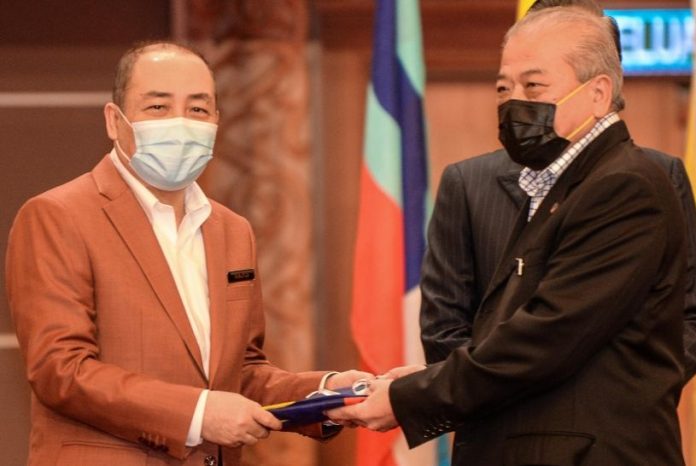KOTA KINABALU: The state government of Sabah should adopt a more visionary, open, inclusive and harmonious economic development policy of “Sabahan Agenda”, instead of the “Bumiutera Agenda” adopted and pushed by the federal government which is not suitable for Sabah, said Tan Sri T.C Goh, President of the Federation of Chinese Associations Sabah (FCAS).
He especially described the recent requirement set by the federal government for 51% Bumiputera equity in local freight forwarding companies, and the latest policy issued under the 12th Malaysia Plan restricting the sale of Bumiputera shares to non Bumipuitera, as regressive and against the norms of free market and even the government’s own aspiration of promoting business-friendly environment in Malaysia.
Goh who is also a member of Sabah Economic Advisory Council (SEAC) and President of the Federation of Sabah and Labuan Hokkien Associations (FSLHA) thus opined that the state government of Sabah should exercise its political autonomy when it comes to planning the state’s economic development.
He expressed this during an interview by the media which focused on the one-year anniversary of the Gagasan Rakyat Sabah (GRS) rule.
Touching on the direction and economic policy of GRS government, Goh who is also President of the Federation of Chinese Associations Malaysia (Huazong) recognized that, with the Covid-19 pandemic gradually under control and various economic sectors are allowed to re open in stages, among the crucial tasks of the state government now is to ensure a full and speedy recovery of the state economy, and its continuous growth.
He opined that, besides adopting some of the economic recovery measures and policies formulated by the federal government, the state government should also have its own set of economic policies which better suit the state’s requirements and conditions.
“Take for example, the recently hotly debated requirement for 51% Bumiputera equity in local freight forwarding companies, and the latest policy issued under the 12th Malaysia Plan restricting the sale of Bumiputera shares to non Bumipuitera, are certainly not suitable a state like Sabah which has more ethnic groups compared to others. I therefore strongly propose the state government to adopt a more open-and-pragmatic economic policy for Sabah,” he urged.
He underscored that the best approach in the right direction is for the state government to enlarge its existing economic pie, and to encourage and facilitate business joint ventures among various ethnic groups. He believed such an open, inclusive, pragmatic and harmonious approach would truly benefit Sabahans of all races as it would better uplift their economic status through greater participation in the state’s economic development.
He also reminded the fact that Sabah is endowed with rich natural resources and beautiful nature which can be further developed for agriculture and tourism purposes.
Meanwhile, he acknowledged that the GRS state government which was formed after the state election in last September, amidst a fluid political situation at national and state level, besides having to grapple with the persisting Covid-19 pandemic, has a long way to go.
He was nonetheless convinced that the GRS-led state government, which consists of various component parties, would continue to place the state and the people’s interests as top priority, while governing the state.
He underscored that, what really matter for a vast majority of Sabahans is continued political stability and a speedy economic recovery for Sabah, and to achieve greater economic growth and ‘shared prosperity’ through implementations of the various economic programmes under the 12th Malaysia Plan (12MP) and the state’s own Sabah Maju Jaya (SMJ) development master plan.
Goh acknowledged that the pandemic had posed a tough challenge for the state government led by Chief Minister Datuk Seri Hajiji Mohd Noor, especially in procurement of necessary aids and resources from the federal government, which include financial aids, medical personnel and staff, and medical equipment and vaccines.
“It is commendable that throughout the pandemic, the state government had put in a lot of effort to assist the people and businesses to better cope with the dire situation. This includes providing living allowances and welfare aid for those who were badly affected through its own Prihatin and economic aid packages,” he said.
He also commended the state government and the chief minister for adopting a liberal approach in governing the state, especially for listening to the views and taking into consideration of the feedbacks and proposals given by the stakeholders and civil society organizations (CSOs) in the state, FCAS and the SEAC included, when formulating its policies.
“As a member of the SEAC, I could really appreciate the sincerity and openness of the state government and our Chief Minister, as reflected in the positive response to the views and proposals presented by FCAS on behalf of the Chinese community of Sabah, on numerous occasions,” he concluded.


